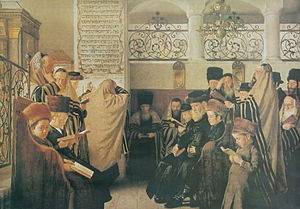The Illusion of Orthodox Education, II
The issue of Tikkun Olam which I have discussed yesterday is an indicator of the greatest misunderstanding in the field of Jewish Education, which is the distinction between acquiring information and being able to put that information to practical use. To be honest, this problem is not limited to Jewish education, but it is more acute for us because of our reputation as the People of the Book and our tendency to turn every text, in its time, into sacred text.
The accurate translation of the Hebrew word for education – חינוך, is inauguration. It appears once in the Bible in the context of teaching a child (Prov. 22:6), and one in the context of disciples (Gen. 14:14). The Mishnah uses the term to speak about the first time that a child is introduced to the observance of a mitzvah (Yoma 8:4), and in medieval times the word gained the meaning it has today. But though the word went though linguistic evolution, its core meaning is still accurate. Just as the inauguration of a structure is geared towards the functionality of that structure, so the education of a child should be geared towards providing the learner for living life in the best way possible and to realize his or her potential.
In his fascinating book Free to Learn, Peter Gray explains that traditional societies, that concept meant that a child would follow his parents around and participate in all their activities and slowly progress from mock activities to assuming responsibility. The child will learn to identify plants, use tools, wield weapons, read tracks, and make food, and when the time comes, he or she will pass this knowledge to their descendants, hopefully with additional useful information they have gathered or created. Children still have plenty of time to play and have fun, but they are constantly engaged in learning new and practical things.
Now let us take a moment to think about the schools we or our children have attended, or the ones we have taught at. Was there a good balance between having fun, learning for the sake of learning, and learning with a sense of practicality and direction? Let us also think about the difference between the learning style in high school and colleges. I must admit that after many years of teaching higher education I find it very difficult to go back and teach in high school. Part of it is the sense of purpose and responsibility. High school students feel that they are forced to learn an array of subjects to which they do not necessarily connect, or in which they do not see any need, while at college not only they have certain freedom in choosing courses and subjects, but they also have a sense of direction.
When we approach the issue of Jewish education and ask whether that element of inauguration is still there, and whether we seek to provide the learners with tools which will help them live their lives to the fullest, I fear that the answer would be disappointing. While there is an emphasis on teaching מידות טובות ודרך ארץ – manners, ethics, and civility, those are usually catalogued under a separate rubric and are not an integral part of the curriculum or the educational methodology. Instead of applied knowledge and transformative learning experience, teachers focus on acquisition of information, quite often the information they consider most important.
We teach Torah with commentaries, Parashat HaShavua with little pearls of wisdom, Nevi’im and Ketuvim, Mishnah, Talmud, Jewish philosophy, Halakha, Jewish history, Zionism, Holocaust studies, and many other fascinating subjects which could all be inspiring and practical, yet it is very easy to become engrossed in abstract or impractical pieces of information. For example:
Torah – Sacrifices
Why do we have to make our students memorize all the different categories of sacrifices and when they are being offered? We can summarize the whole list one page, as in chapter 5 of tractate Zevahim, and move on. Those who are interested could learn it on their own. When the Temple will be built, and when we will know which sacrifices are required, there will be enough time to train the few chosen in the secrets of the Temple service. We can dedicate the time saved to analyze the criticism the prophets leveled at those people who thought that the sacrifice are an automated system to achieve their wishes without changing their ways, and ask how does this criticism applies to the way we pray today.
There are more examples, and I would love to hear from you about your experience and feelings on the subject.








Parashat Behar – Weekday Torah Reading (Moroccan TeAmim)